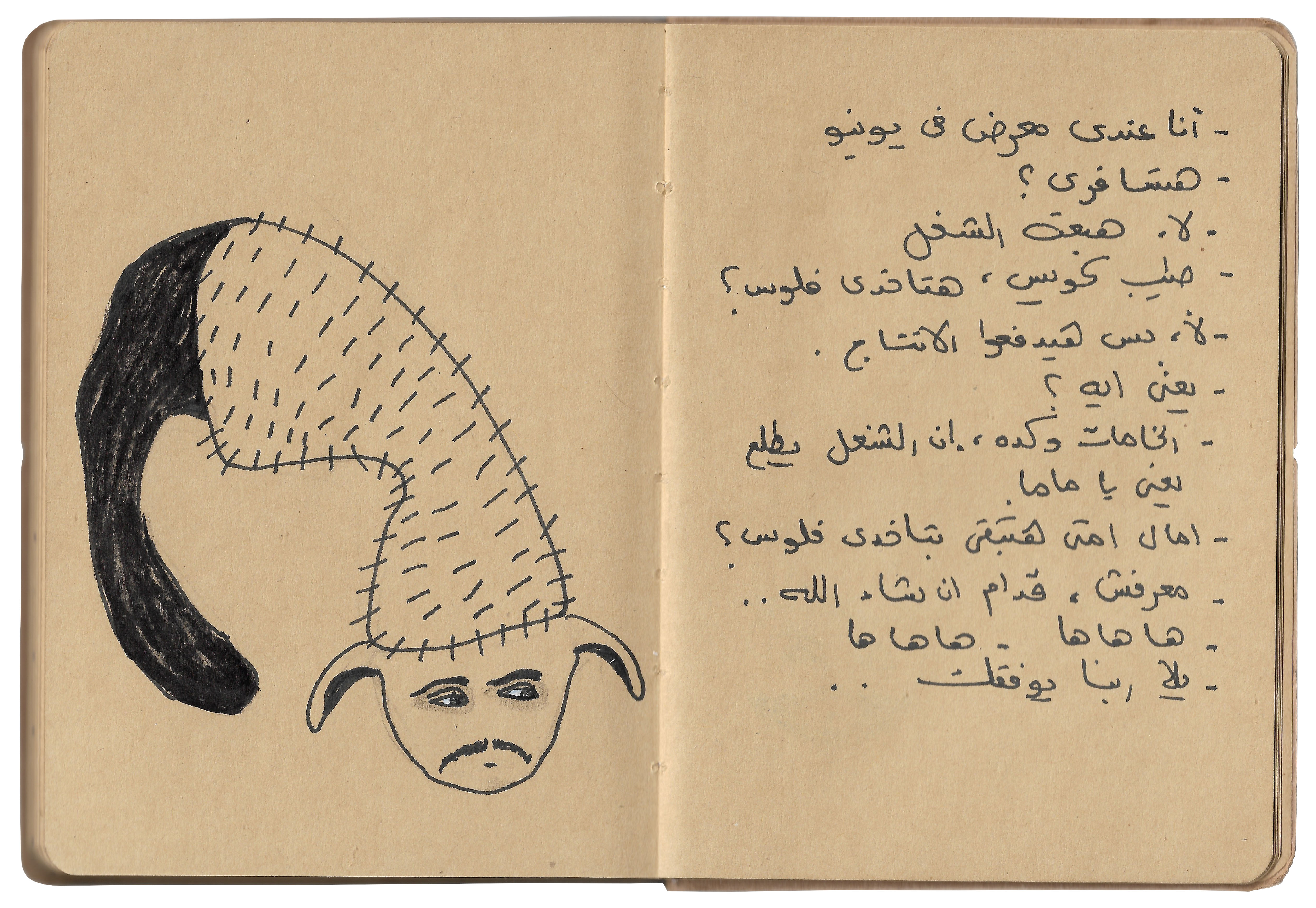ESSAYS
RANIA ATEF
IS THERE A BIRD THAT STOPS FLYING?

Conversations in a Beehive, Diaries books(Text and ink on paper)
Rania Atef, 2020
Despite the severity of the times and the troubles this has caused for me as a mother-artist, I cannot deny that there is a hidden relief at the demise of mobility for artists. Although movement is a necessity for artistic work and its development, it becomes a burden for mother- artists. I do not mean to generalise here, but I think there are many who share these same feelings with me and are also questioning how the art scene will move on from this moment. Will the means of operation change or will we return to the status quo?
The train has stopped. There is no one gasping to catch up. Everyone is seated and the state of “staying” has become compulsory and not optional. My feelings of anxiety, tension, and constant thinking have abated (temporarily) since I am no longer required to answer any more questions, or think of more planning.
As soon as I receive an invitation or acceptance letter for a residency, exhibition, or artist talk, a barrage of the following questions usually springs to mind:
Should I take my daughter or not?
Will she feel disappointed?
Will she feel disappointed if I left her?
Should I feel guilty?
How many days can I leave her with her my dad and my mom?
How much can I compress my schedule in order to return earlier?
Who will fetch her from school while her father is at work?
What if I take her with me?
Will I be able to work while she is present?
Will she be bored?
How shall I entertain her?
How can I install and prepare the work?
(I can work continuously for hours, subsisting on snacks, but she is only a child, and she shouldn’t be in this situation!)
Who will pay for her airline ticket?
Can the host or the institution bear the price of her ticket?
The answer is most often no!
Can I use my artist fees to pay for her ticket?
Will it be enough?
What will be left?
Speaking of institutions, I feel that for them being a mother-artist is almost invisible across all levels. They do not support flight tickets for children, nor are most residency programmes prepared or ready to receive mothers with children. And most funds and grants do not accept childcare as an item in a budget.
I was talking once with the director of a cultural institution and he said that they are about to set up a residency programme and they are currently in the stage of organising housing. I asked him” Do you accept mother artists with their children?” He answered, “Ooooh, it did not cross my mind that mother artists will apply, but now we can consider this!”
Another time I received a travel grant that covered the cost of transportation, living, and accommodation, but then something popped up and I had to take my daughter with me. I then had to find a way to pay for her flight ticket, which was the highest and most difficult item for me, cost-wise. I contacted the grant donor and they agreed to replace the housing item with my daughter's ticket. I then contacted the host – who had sent the invitation – and they offered to provide me with accommodation from their side. It took a lot of organisation and correspondence, but there was a glimpse of hope for the beginning of a vision and understanding of institutions towards the situation of the mother-artist.
No one wants to be unseen or to be denied the opportunity to exhibit and participate in discussions, and thus develop in her art practice. We are not in a situation of choosing to travel. We travel to exhibit, develop, discuss, and meet with a wide spectrum of audiences. However, mother-artists face bureaucratic and logistical barriers, along with institutional infrastructures that do not accommodate them. This additional burden makes opportunities that seem like a dream to everyone, turn out to be real difficulties that are not easy to deal with or escape from.
When I started writing this text, I did not want to seem to be complaining or nagging or asking the world to take responsibility for my decisions and choices. I wanted to share my thoughts, and that might count, to some who share similar circumstances, and this way we will not be possessed by the feeling of loneliness and Isolation. Maybe you will read this text and feel reassured.
ABOUT THE ARTIST
Rania Atef is a visual artist who is interested in investigating reproductive and labour discourse on individual and collective levels, focusing on the infrastructure of social and cultural institutions. Enrolled in TASAWAR curatorial studies (TN), Rania also attended the MASS Alexandria program 2018/19 (EG) and holds a BA Degree in Product design in 2011 (EG). She is part of the “K-OH-llective” artists group.